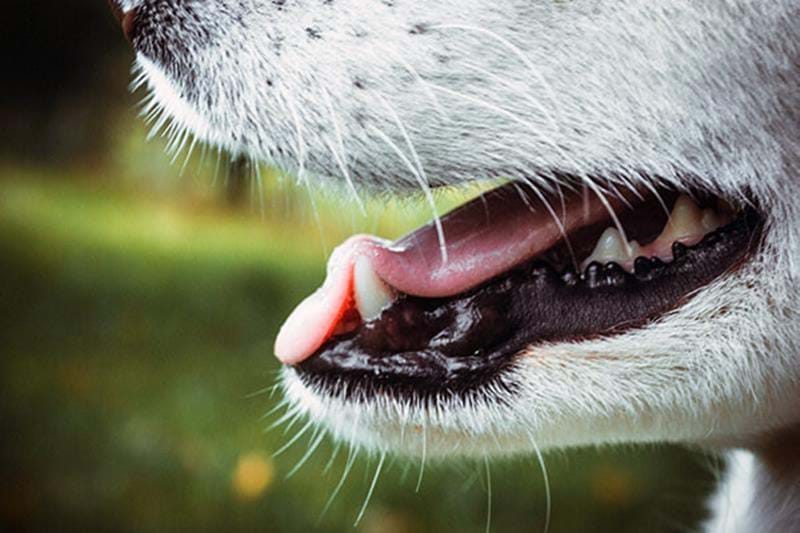When it comes to adult dogs, it is no longer common practice to follow the old principle of deworming “to be safe”. The reason is to reduce the risk of becoming resistant to the deworming medication, which would then have no affect on the parasite. A sample is instead taken if the dog is suspected to have worms. The sample will determine which type of worms the dog potentially havs – for example roundworms or tapeworms. If you are travelling overseas with your dog, you must check what rules apply both when entering the destination country and when you return to Sweden.
DEWORMING OF PUPPIES AND LACTATING BITCHES
Roundworm is found in most puppies as it is transmitted from the female to the puppies already in the uterus or through the breast milk.
That’s why the female dog and the puppies need to be dewormed regularly. Consult a vet about a suitable deworming medication for lactating bitches and puppies and follow the deworming schedule prescribed for that particular medication.
If you have recently collected the puppy from the breeder, ask them if the dog has had all the doses or if you need to administer the last dose yourself. Ask which deworming medication you should use and what deworming schedule you should follow.
DEWORMING OF AN ADULT DOG
In the past, adult dogs were dewormed regularly but the recommendations have changed and today it’s only recommended to deworm dogs in specific cases following a lab analysis of the dogs feces that determines if the dog actually has worms. Otherwise there’s a risk of resistance development. Resistance means that an organism, in this case the worm, develops an ability to survive the drug that is used to fight it.
A testing kit can be purchased at a pharmacy if you suspect your pet has a worm. The faeces sample is sent to a lab for analysis. It will show if our dog is infected by worms and also determine which type of worms it is. To reduce the risk of resistance in the parasites, you should only deworm against the type of worm your dog has.
DEWORMING MEDICATION FOR DOGS
What deworming medication you should use depends on what type of worm your dog has. Consult you vet to determine which medication is most suitable for your dog. Weigh your dog before giving the medication to ensure you get the correct dosage.
Deworming medication comes as tablets and as a paste and can be purchased at pharmacies. Both over-the-counter and prescription variants are available.
Be aware that it may take a few days for the worms to completely disappear from the dog’s faeces, as they will remain dead in the dogs bowl for some time.
SYMPTOMS THAT THE DOG HAS WORMS
It’s not always possible to see the worms with the naked eye. Roundworm is sometimes found in the dog’s vomit, while a tapeworm can be visible near the dogs anus. That’s why it is important to pay attention to the dog’s vomit and faeces.
Other signs that your dog has worms are
- diarrhoea,
- weight loss,
- dull coat,
- vomiting,
- coughing
- poor general condition
HOW WORMS ARE TRANSMITTED AND HOW BIG IS THE RISK
Puppies can catch worms during gestation and also through their mother’s milk during the first months. That’s why deworming of puppies and bitches is done regularly in the beginning.
Adult dogs are mostly exposed though something they eat, such as infected small rodents or by ingesting worm eggs that are present in their local environment. A pet dog in an urban environment with less wildlife is at less risk of catching worms. Hunting dogs, kennel dogs, working dogs and dogs that travel are at a much higher risk of being infected. Unleashed dogs may eat wild rodents or raw meat and intestines and run a real risk of being infected by worms.
DEWORMING OF DOGS PRIOR TO OVERSEAS TRAVEL
Deworming by a vet is a common requirement in order to bring dogs overseas. The Swedish Board of Agriculture has a travel guide for traveling with dogs within and outside the EU. It is important however to find out exactly the rules that apply for each specific country. It is critical to have a clear understanding of the rules and to avoid any problems at the border at departure or arrival.
International travel to some European countries requires deworming against the fox dwarf tapeworm. The treatment must be performed by a vet and be registered on the dog’s EU passport. Contact the vet well ahead of the trip.
ROUNDWORM, TAPEWORM AND DWARF TAPEWORM IN DOGS
The most common worm spieces your puppy or dog may be affected by are the tapeworm and the roundworm. They are relatively harmless if they are treated immediately.
The dwarf tapeworm is significantly more harmful for the dog, but luckily it’s very rare in Sweden.
ROUNDWORM IN DOGS
Roundworm in dogs is mostly occurring in puppies and young dogs. It is yellow in colour and about 6-18 cm long, making it relatively easy to detect in the dog’s faeces and vomit. If there are many worms present it will be unhealthy for your animal.
The roundworm grows in the puppy’s bowl and travels to the lungs and causes coughing. This doesn’t happen in adult dogs. In adult dogs roundworm is found in the pet’s bowels. In the larval stage, the worms can travel to other organs where they settle. Larvae are activated when the dog becomes pregnant after which they can infect the puppy as a foetus or later, when breastfeeding.
Roundworms in dogs are relatively easy to treat. The treatment and deworming does not have long term affects and the dog may become reinfected.
TAPEWORM IN DOGS
If a dog has tapeworm then you can see the worm’s egg capsules in the dog’s faeces, near the anus or at the bottom of the tail. The egg capsules look similar to rice grains.
Tapeworm in dogs is transmitted via so-called intermediate hosts. This happens when a dog eats another infected animal, for example a small rodent or even an infected flea, and becomes infected. Adult dogs are more susceptable than puppies because the infection always comes from an intermediate host. Hunting dogs are at the highest risk of being infected as they eat raw meat and intestines, or dogs that attract flea infections.
Tapeworm in dogs does not lead to any serious complications if the dog is dewormed immediately.
DWARF TAPEWORM IN DOGS
Dwarf tapeworm is the most harmful worm spieces and can damage the dog’s liver, lungs and other organs attacked by the parasite. Dwarf typeworm is very rare in Sweden. Dwarf tapeworm is mostly present in dogs in countries where they serve as sheperd dogs.
Dwarf tapeworm uses both main host animals (where the grown parasite lives) and intermediate hosts (where the eggs develop to larvae) and are transmitted via the same process as the more common types of tapeworm.
A particular type of dwarf tapeworm can be found in foxes and can also be transmitted to dogs. This type of dwarf tapeworm causes serious complications for a dog’s health. That’s why it is important to be careful with faeces from foxes.
It is usually recommended to deworm the dog if there is a risk of Dwarf tapeworm in the area where you live, but please consult a vet first.







